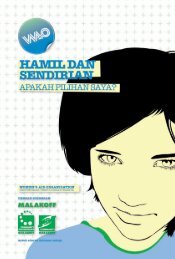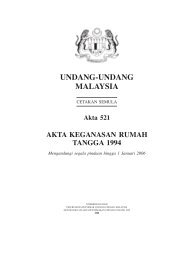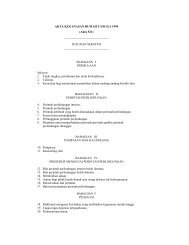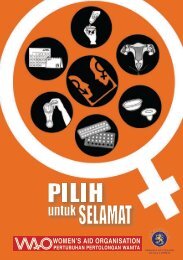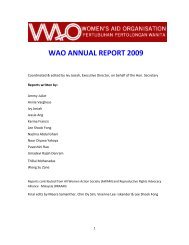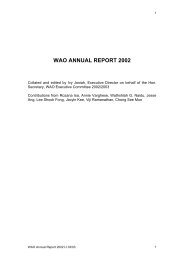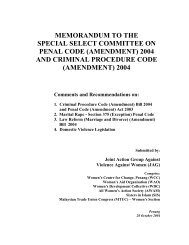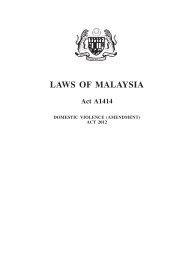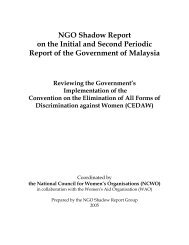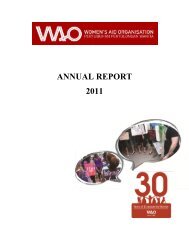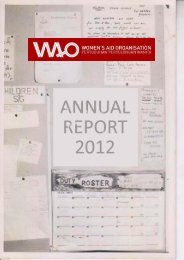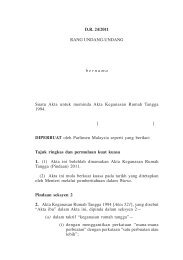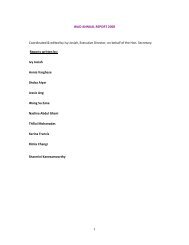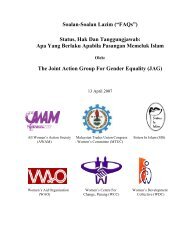October - December - Women's Aid Organisation
October - December - Women's Aid Organisation
October - December - Women's Aid Organisation
Create successful ePaper yourself
Turn your PDF publications into a flip-book with our unique Google optimized e-Paper software.
INROADS<br />
Quarter 1, 2006
Inroads, Quarter 1, 2006<br />
Staff Announcements<br />
A big welcome back to Nabila Nasir as our new Project Assistant.<br />
A big welcome back to Kalai, Child minder!<br />
It was a sad farewell to Karen Tan, Project Assistant, who returned to Australia.<br />
A sad farewell to our longtime child minder, Amutha.<br />
EXECUTIVE COMMITTEE MEMBERS<br />
President<br />
Meera Samanther<br />
Vice President<br />
Shanthi Diariam<br />
Hon. Secretary<br />
Mok Chuang Lian<br />
Asst. Secretary<br />
Rozana Isa<br />
Hon. Treasurer<br />
Yeow Ai Lin<br />
Asst. Treasurer<br />
Sharon Hariharan<br />
Comm. Member<br />
Vivienne Lee Iskandar<br />
Musfiza Mustapa<br />
Carol Chin<br />
This edition was compiled by Norhajah<br />
Idris and Diya Gosh, Intern. Thank you to<br />
all who helped put this together!!<br />
STAFF<br />
Executive Director<br />
Ivy Josiah<br />
Finance & Admin Manager<br />
Sharmini Kanesamoorthy<br />
Projects & Admin Manager<br />
Annie Varghese<br />
Projects Assistant<br />
Nabila Nasir<br />
Admin. Assistant<br />
Thillai Nayaki<br />
Accounts & Admin Assistant<br />
Puspawati Ismail<br />
Programme Officer<br />
Vizla Kumaresan<br />
Social Worker Manager<br />
Shoba Aiyar<br />
Social Workers<br />
Jessie Ang<br />
Nazlina Abd Ghani<br />
Saralah Devi<br />
Wong Su Zane<br />
Librarian<br />
Mariam Salleh<br />
Night Supervisor<br />
Normah Md. Noor<br />
Child Social Worker<br />
Daljeen Kaur Jassal<br />
CCC Supervisor<br />
Mary Selina<br />
CCC Child Minders<br />
Vijaya Anumiah<br />
Hanif Nuk’awanah Nuhyi<br />
Kalayivani
Inroads, Quarter 1, 2006<br />
In Focus<br />
Eye on the Islamic<br />
Family Law<br />
1984 saw the first inklings of a move towards a uniform Islamic Family Law (IFL) for<br />
all states in Malaysia. At the time, Malaysia developed one of the first Islamic laws of<br />
this kind. It was progressive, and was seen as the model Islamic family law of the<br />
Muslim world. Other Muslim countries began emulating our laws when drafting their<br />
respective family law bills.<br />
However, a few amendments made to the 1984 IFL began to mark its movement away<br />
from gender equality. One of these amendments was the validation of divorce and<br />
polygamy contracted outside the court. The five conditions that were necessary in order<br />
for a man to contract polygamy became four. The condition that the standard of living<br />
of the first wife (or existing wives) should not be lowered was removed.<br />
Concurrent to the amendments in the IFL, other changes were taking place that<br />
discriminated against Muslim women. In 2000, a Fatwa regarding EPF and SOCSO<br />
benefits was issued. It said that even though a wife becomes beneficiary to the schemes,<br />
she can only act as the administrator of the estate. The property will be divided<br />
according to ‘hukum faraid’ or inheritance law.<br />
While Muslim women were facing more and more discrimination in the law, Civil laws<br />
were becoming progressive, with a movement towards gender equality. This began in<br />
1976, when a Parliamentary Select Committee was formed to review civil family law.<br />
Out of that came the Law Reform (Marriage and Divorce) Act, 1976. Later, the<br />
Guardianship Act was amended to allow equal guardianship to booth males and<br />
females. This however, was not applicable for Muslims.<br />
The highly debated 2005 Amendments actually began in 2001. The state of Selangor<br />
was the first to adopt and enforce the law, in 2003. By 2005, 11 states had already<br />
enforced the law. When faced with protest from Sisters in Islam (SIS), state officials all<br />
insisted that the best way to go with the law was to ‘accept it first and amend later’.<br />
It should be noted that SIS had been monitoring all the changes taking place, and<br />
protesting to the various agencies involved. In 2002, they handed a 42-page<br />
memorandum to the various ministries, calling attention to the discriminatory laws and<br />
for the implementation of a Muslim family law based on the principles of equality and<br />
justice.
Inroads, Quarter 1, 2006<br />
There are many aspects of the amended IFL that are discriminatory towards women.<br />
However, the 5 main contentious issues are:<br />
• To contract polygamy, the man has to show that the marriage is ‘just or necessary’<br />
rather than being ‘just and necessary’,<br />
• The division of ‘harta sepencarian’ (matrimonial property), upon polygamy, can be<br />
claimed by ‘any party’. The gender neutral language used here is unfair as the<br />
practice in court makes it easier for men to access the law, rather than women,<br />
• The first wife, or existing wives, have to choose between matrimonial property or<br />
maintenance, upon the husbands polygamy,<br />
• The husband can stop his wife from dispossessing her property under application for<br />
matrimonial property, and<br />
• The right to fasakh 1 divorce has been extended to men, on top of their right to talaq 1<br />
divorce.<br />
In November 2005, the IFL came up for debate in the Senate, for to be passed in the Federal<br />
Territories. The women senators were lobbied about the discriminatory aspects of the IFL,<br />
and all of then opposed it. However after weeks of lobbying by Sisters in Islam (SIS), and<br />
under immense media attention, the Senators were forced to vote for the IFL, when the party<br />
whip was invoked, despite their opposition to it. Following the controversial voting, the<br />
media was flooded with letters from outraged members of the public wanting to show their<br />
dissatisfaction with the law.<br />
Among the calls from SIS on behalf of the Joint Action Group on Gender Equality (JAG), is<br />
to not gazette the law in the Federal Territory, to place a moratorium on the laws that have<br />
been passed is other states, the formation of a Parliamentary Select Committee to review the<br />
Islamic laws and how they are affecting women, and to redraft the law and introduce a new<br />
Muslim Family Law based on the principles of equality and justice.<br />
It is important for civil society to be vigilant with the developments of the IFL. Lately, there<br />
has been a lot of news in the press regarding the IFL, with a different sort of reaction to it.<br />
Politicians who earlier were did admit to the flaws in the law, and are now claiming that the<br />
law is perfect. It is reactions like this that civil society has to respond to. Write letters to the<br />
printed media. If not a letter, most newspapers now have a section where members of the<br />
public can air their grievances via SMS. A short note outlining your dissatisfaction can speak<br />
volumes.<br />
Source: Sisters In Islam
Inroads, Quarter 1, 2006<br />
An Ongoing Case<br />
A Muslim Woman’s<br />
Hardship<br />
Zakiah, a twenty five year old Malay woman with a four year old son came to seek shelter early<br />
last year. She is a victim of domestic violence and her husband had pronounced ‘talak’ several<br />
times when she had gone out of the gate of their house or had gone to see her parents after an<br />
incident of abuse.<br />
Background<br />
Zakiah comes from a middle class family and was educated in a religious school. She is a beautiful<br />
petite woman, soft spoken and very articulate in her thoughts. She met her husband at a wedding.<br />
There was mutual attraction and despite protest from both sides, they got married. According to<br />
her, he was a confident person, good looking and attached to a multinational company.<br />
After the marriage, they moved into his parents’ home and she performed all the household tasks.<br />
She was expected to serve his mother, cook and<br />
clean. She had no freedom to do what she<br />
wanted or free time for herself.<br />
Abuse<br />
Just two months after the marriage, the abuse<br />
started. She was quite stunned in the manner it<br />
started. They would check into a hotel, and he<br />
would pick a fight with her for no reason and<br />
then beat her with his bare hands. This became a<br />
norm and as time went by, he was bold enough<br />
to abuse her in front of his parents. She being an<br />
obedient person, would tolerate it and forgave<br />
him. After sometime, she managed to persuade<br />
him to move out of the in-laws house and into<br />
their own. She believed that by doing so, they<br />
would be able to resolve their problems.<br />
However, her problems were far from over. Her husband was hot tempered and got angry for the<br />
slightest reasons. He would often demand that she cut the vegetables the way his mother used to<br />
cut and if she made a mistake of not doing so, he would lash out at her. He would slap her till her<br />
face was swollen, strangle her, kick her and bang her head on the wall. He used to use words like<br />
‘swine’ and ‘bitch’ and other vulgar words that she never heard before.
Inroads, Quarter 1, 2006<br />
She did not want to leave him, although the thought came to her very often, as she didn’t want<br />
to bring shame upon both families. She was so traumatized by the abuse that she thought she<br />
was loosing her sanity. As time went by, she became an introverted and disorientated person.<br />
Often she would pray to hear an apology from him for his behaviour, but none came. Not being<br />
able to stand the long silence between them, she would be the one apologizing for her actions.<br />
Many a times, he had chased her out of their home but would not allow her go to her parent’s<br />
house. She thought if they had a baby, he would change his ways. However, throughout her<br />
pregnancy, she was abused. After delivery, their sex life changed. He claimed she was not<br />
attractive to him any more.<br />
Realising her family life not improving despite having a son, she became very unhappy and<br />
had no reason to continue their six years of marriage. She decided to confide in her sister about<br />
her predicament. Shocked at what has been happening, her sister began to call numbers that she<br />
found in the papers and came upon WAO’s number. She gave it to Zakiah.<br />
Finding a right time to leave was difficult, as the in-laws had moved in to ‘watch’ over her.<br />
When they were in prayer one day, she took the opportunity to gather a few of her things and<br />
ran out with her son. She made her way to the Jabatan Agama to state her reasons for leaving<br />
home and that her husband had claimed he would divorce her many times before. Then she<br />
came to WAO. She, very reluctantly, made a police report against him regarding the abuse as<br />
she still did not want to bring him shame.<br />
Decision<br />
With the support of her family, she managed to get a lawyer to le for divorce and custody of<br />
their son. This was in late July 2005. Since then she had gone to court more than six times. The<br />
process was long drawn and complicated.<br />
Court System<br />
The first appearance in court was a reconciliation meeting called ‘suluh’, or a mediation<br />
meeting between both parties. When there was no settlement, both had to hire lawyers to fight<br />
their case in court. To do this, she had to go again to court to have a ‘ceremony’ or ‘wakalah’<br />
to appoint her lawyer upon which he was to get another date to x the “hearing date”. However,<br />
when the date came up, the case was postponed.<br />
This was not the end, as the case of the divorce and of the custody were postponed several<br />
times; Reasons for this the judge was on emergency leave, court had a ceremony for<br />
installation of new lawyers, the husband had denied he had uttered ‘talak’ and the judge had<br />
gone to perform his “haj”.<br />
An Explanation<br />
The Syariah court, works differently from civil courts where both divorce and<br />
custody are submitted in one application.
Inroads, Quarter 1, 2006<br />
An Explanation<br />
The Syariah court, works differently from civil courts where both divorce and<br />
custody are submitted in one application.<br />
She had to open six files to hear her matters: They were 1) confirmation of the<br />
divorce, 2) application for temporary custody, 3) setting aside of the<br />
temporary custody obtained by the husband first, 4) application for permanent<br />
custody, 5) maintenance and 6) obtaining matrimonial property. Every time,<br />
she had a court hearing, queries or to submit documents, she had to pay the<br />
lawyer for appearing in court or the court office.<br />
For six months she endured this and on her final hearing date, she managed to<br />
give testimony about her marriage. Her husband, however, was not present.<br />
Rightly, the judge went on with the case as it had been postponed too many<br />
times. Luck was on her side as his lawyer called for an out of court settlement.<br />
He proposed to give her custody of the son and a house to stay in so that she<br />
could send him to school and he was able visit him whenever possible.<br />
Zakiah was relieved as she felt now she could go on with her life. She hoped<br />
to seal the agreement as soon as possible so her husband will not change his<br />
mind when the time came. Her battle still goes on for the other files…as she<br />
hopes and prays. Court proceedings are still pending and she hopes and prays<br />
for a just solution.<br />
Shoba Aiyar ▪ Social Worker
16 DAYS OF ACTIVISM AGAINST GENDER<br />
VIOLENCE<br />
Get The Knowledge, Get The Power, Keep The Promise<br />
The campaign kicked off on 25th November 2005 at the Berjaya Times Square in<br />
conjunction with the annual global campaign. Joined by friends, affiliates and the media,<br />
each organization gave inspiring speeches on the issues of gender and violence against<br />
women.<br />
The theme for the campaign was “Get the Power, Get the Knowledge, Keep the Promise.”<br />
The star attractions, amongst the strategically placed booths, were Noree, a young upcoming<br />
star who contributes regularly to WAO through a percentage from album sales, and Dina,<br />
first runner up of the first Malaysian Idol.<br />
On 26 th November 2005, the collective traveled to Kinta City Shopping Centre, Ipoh. Starting<br />
set up at about 9 am, the event ran the whole day greeting warm crowds. A healthy mix of<br />
responses was received from the messages on the sandwich boards donned by the volunteers<br />
of the campaign. Some of brightly painted sandwich boards read, “Women are Social<br />
Subjects, not Sexual Objects”, “One Husband = One Wife” and “Don’t Turn A Blind Eye To<br />
Domestic Violence”.<br />
On the 27th November 2005, Sisters In Islam<br />
and Women’s <strong>Aid</strong> Organization were back at<br />
Berjaya Times Square setting up information<br />
booths. The crowd, of families and young<br />
teenagers, were out on a Sunday afternoon<br />
stroll, allowing for a relaxed and nonchalant<br />
atmosphere. Though many were intrigued by<br />
stunts pulled by the volunteers lying on the<br />
floor, surrounded by sandwich boards or lining<br />
up wearing the sandwich boards, like at a<br />
protest!<br />
Subang Parade was full of shoppers, perusing<br />
around the flea market outside MPH<br />
bookstore, and the16 Days of Activism<br />
Against Gender Violence continued on the 3 rd<br />
<strong>December</strong> 2005. A loose coalition of artists<br />
joined the NGO stalls to paint a mural. Calling<br />
themselves KataGender, the collective works<br />
to promote social activism and ultimately
Inroads, Quarter 1, 2006<br />
A campaign by Women’s <strong>Aid</strong> <strong>Organisation</strong>, Sisters in Islam,<br />
Malaysian AIDS Council, Amnesty International, All<br />
<strong>Women's</strong> Action Society.
Inroads, Quarter 1, 2006<br />
A Child’s Right to…<br />
Education<br />
The Right to Education occupies a central place in Human<br />
Rights and is essential for development.<br />
Children who are educated will be more productive at home, better paid in the<br />
workplace, better able to protect themselves against HIV/AIDS and other diseases<br />
and they tend to assume a more active role in social, economic and political<br />
decision-making throughout their lives.<br />
Sarah, Age 7<br />
Without education, a mother faces<br />
difficulties in protecting her child from<br />
avoidable illness and disease. A father<br />
may unknowingly deny his child a<br />
nurturing and caring environment that<br />
has profound effects on the child’s<br />
ability to develop. A girl who is denied<br />
access to education increases her<br />
vulnerability to abuse and exploitation.<br />
A boy may lack a sense of power and<br />
hope for the future.<br />
Children are denied the right to an education due to myriad reasons. Poverty,<br />
issues of safety and security in and around school and disinterest towards subject<br />
matter are examples of why this happens. Without accelerated action to get the<br />
children into schools, global goals to improve the human condition will simply not<br />
be reached.<br />
The public and government both have active roles to<br />
play in realizing the full potential of children.<br />
Education should be free and made available to all.<br />
Improved infrastructure and training for school<br />
personnel should be conducted. The National school<br />
syllabus should be revamped to include subjects that<br />
pertain to the current issues faced by children. For<br />
example, the inclusion of Sex Education should be<br />
recognized. Parents must also play an important role,<br />
as instilling the importance of education begins at home.<br />
5<br />
Hally,<br />
Age<br />
Women’s <strong>Aid</strong> <strong>Organisation</strong> (WAO) operates a Child Care Centre (CCC) which<br />
provides education and care for children of single mothers. We subscribe to the<br />
tenets of UNICEF’s Convention on the Rights of the Child (CRC) in which all
Inroads, Quarter 1, 2006<br />
children have an unquestionable right to an education. The CRC is not limited to<br />
formal education. It also encompasses the development of the child's personality,<br />
talents and mental and physical abilities to their fullest potential.<br />
At CCC, tutorial sessions are carried out alongside programs dealing with issues<br />
such as anger, self-esteem, bullying, abuse, and personal safety. Assistance is<br />
provided in the form of remedial work for children who are unable to read and write,<br />
while the tutorial sessions guide them with their schoolwork. The programs are<br />
developed to provide the children with the vital tools to cope with the challenges<br />
they face in life.<br />
Our children deserve the right to a better lifestyle than the ones they now possess.<br />
We should defend this inherent right and also shelter them. They are the hope of<br />
our future and will soon become the leaders of our countries.<br />
Daljeen Kaur Jassal Child Social Worker<br />
Froggin’<br />
An idea initiated by volunteers turned out to be an unforgettable night for the children. The children<br />
spent the day learning about frogs and at night, viewing them in their natural habitat. At the Child<br />
Care Centre, volunteers assisted the children as they drew the life cycle of the frog and made frog<br />
origami. At night, the children took a walk in the jungle of the Forest Research Institute of Malaysia<br />
(FRIM) to view frogs.<br />
A generous donation of tickets provided the<br />
children with an opportunity to attend the Hollywood on Ice show. The show was<br />
attended by current and former residents and was held in Bukit Jalil. Audiences<br />
were entertained with classic songs from Hollywood movies. The children were<br />
mesmerized by the skating skills of the performer.
Inroads, Quarter 1, 2006<br />
people, 3 staff and 2 brilliant volunteers heading off to the sandy shores of Port Dickson for a<br />
few days of fun…. and lots of sun! After a range of “getting to know you games” (which<br />
included dancing on the bus), this great group of energetic kids were clearly ready for any<br />
activity we threw their way!<br />
So, we took them to the TNB Refinery in Port Dickson to test them on their knowledge of<br />
electricity, but they just put on their hardhats and wandered around like true professionals! The<br />
kids put up an equal challenge at the Port Dickson Police Station, as they threw so many<br />
questions at Inspector Zazali, even he was so impressed by the WAO kids that he even<br />
allowed a one off photo shoot inside, on and around the police van with handcuffs!<br />
The focus of the youth camp was to empower the kids in a range of ways and we were<br />
extremely lucky to be joined by Mr Lum Chee Seng, a psychologist who presented a session<br />
on Love, Communication and Relationships. This was truly entertaining as he had the kids<br />
brainstorming, singing, dancing, playing football with an egg and propelling each<br />
other over a piece of string tied to a tree…! The fun continued with psychologist Valerie<br />
Jacques, who had the kids engaged with her session on Sex, Love and Pregnancy. This<br />
activity was based on discussing highly important issues relating to changing emotions, sex,<br />
and safe and appropriate relationships. And….as you can imagine they were extremely<br />
interested and of course further educated!<br />
Even after all the information on careers, life, love, team building, piñata making (and<br />
smashing), bbq-ing, and games, the kids still had the energy to soak up the sun! Burying eachother<br />
in the sand on the beach (which was directly across the road) appeared to be a favourite<br />
pastime; this was an act of true bonding with old friends and newfound friends!<br />
Overall the camp was such a great success and we extend our thanks to the volunteers, the<br />
people who were so accommodating in Port Dickson, those who educated and enlightened the<br />
kids…and of course the kids themselves for being brilliant, fantastic and an absolute pleasure<br />
to spend time with!<br />
Jasmine Intern
I hope that WAO will continue to be the ever needed, approachable and respected aid<br />
center and be a leading example for other aid centers in Malaysia. And I hope to lend my<br />
support to the organisation to the best of my ability & availability!



